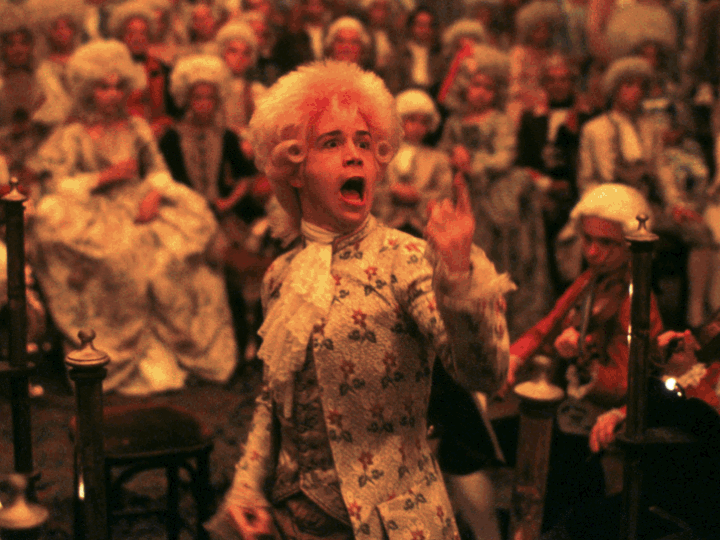Pacino’s Payoff
- Share via
The modest but distinct pleasure offered by “Hughie,” Eugene O’Neill’s 1942 one-act directed by and co-starring Al Pacino, has nothing to do with a big star busting out, scaling Mt. Everest, braving the Role of a Lifetime.
It’s not that sort of performance, or that kind of material.
Making his Los Angeles stage debut at the Mark Taper Forum--about time, pal--Pacino works in a comfortable, affable, low-keyed range as “Erie” Smith, O’Neill’s pipe-dreaming Broadway sport. For roughly an hour, just before dawn one morning in the summer of 1928, Erie bends the ear of a diffident hotel night clerk. The clerk is played by Paul Benedict, who co-starred with Pacino in the 1996 New York edition of “Hughie.”
If O’Neill had made room for one more character in “The Iceman Cometh,” completed two years prior to “Hughie,” Erie would’ve fit right in. He’s a sometime gambler on a cold streak, as well as an errand runner (so he claims) for gangsters. Since the previous long-term night clerk, Hughie, took ill, Erie’s luck has fled. The gambler sees Hughie’s replacement as a source of hope.
Erie’s a spiritual cousin to Lefty, the low-level Mafioso employee Pacino made memorable in “Donnie Brasco” (1997). That performance was small yet full, a well-considered symphony of tinny bravado and averted glances. It was good to see Pacino rise to the character’s sunken level, as it were (especially after his why-am-I-SUDDENLY-YELLING? turn in “Heat”). Lefty, in his own words, was “a spoke on a wheel.” That’s O’Neill’s man all over. In “Hughie,” the wheel is Broadway. The spokes, even the broken ones, feed straight into its mythic stature.
On stage Pacino tells you a lot with a little, from the moment he clomps onto scenic designer David Gallo’s exploded, abstract hotel setting, his necktie knot a full yard or two south of his neck. Erie’s a windbag, but he’s not histrionic, and the actor respects that. His unsteady feet splayed in a duckwalk stance, Pacino finds surprising layers of humor in Erie’s prattle. This trashed-out “Broadway guy,” a neat contrast to Benedict’s reluctant sounding board, doesn’t quite touch the heart. Paradoxically, that’s also to Pacino’s credit. He doesn’t milk the role for pathos. O’Neill milked plenty on his own.
The major directorial flourish is a mixed blessing. Pacino has done everything possible to make “Hughie” a two-character play, rather than a de facto monologue. In this production, the night clerk’s thoughts--O’Neill’s authorial descriptions of what’s running through the clerk’s distracted mind--are often heard out loud, spoken by Benedict via a subtle echo effect.
The device heightens the presence of the secondary character. But in another way it’s reductive. It makes the clerk’s boredom obvious rather than implied. Benedict handles these voice-overs extremely well, drawing the right, glancing sort of laughs. In the end, though, comments such as “What’s he talkin’ about?” tell us too much, and not enough.
It’s interesting to see a little play like “Hughie” treated to a large, quasi-Expressionistic physical and aural environment, in which the 1928 cityscape and its ghostly, early-morning sounds serve not as background noise, but foreground atmosphere. Lighting designer Donald Holder and sound designer Jon Gottlieb keep their effects subtle, but the look and sound is a lot for O’Neill’s play to handle. Also, Pacino’s direction and pacing could use a rhythmic zigzag or two, particularly near the end--when Erie sees the light of day, both figurative and literal.
The play, short and vinegary, is both minor-key and, in the scheme of O’Neill’s career, minor. Seeing Pacino in his L.A. stage debut is not. And seeing Pacino and Benedict mix it up, warily, eloquently, is no minor thing, either. You can argue with the conceptual nudges, but the acting’s pretty damned good. Pacino’s characterful rasp is a world away from Benedict’s unique, reedy voice, and the contrast works. These two mugs really do seem like unlikely longtime pals in the making. If the characters’ friendship is built on less-than-solid ground, well, as O’Neill’s clerk says, with a nearly audible shrug: That’s life.
* “Hughie,” Mark Taper Forum, Music Center of Los Angeles County, 135 N. Grand Ave., downtown. Tuesdays-Fridays, 8 p.m.; Saturdays, 2:30 and 8 p.m.; Sundays, 2:30 and 7:30 p.m. Ends July 25. Sold out except for limited number of $12 public rush tickets available by lottery. Drawings at 12:30 p.m. for matinees, lineups starting at noon; 6 p.m. for evening shows, with 5:30 p.m. lineups. Two tickets per person, cash only. (213) 628-2772. Running time: 1 hour.
Al Pacino: Erie Smith
Paul Benedict: Charlie Hughes
Written by Eugene O’Neill. Directed by Al Pacino. Set by David Gallo. Costumes by Candice Donnelly. Lighting by Donald Holder. Sound by Jon Gottlieb. Production stage manager Jack Gianino.
More to Read
The biggest entertainment stories
Get our big stories about Hollywood, film, television, music, arts, culture and more right in your inbox as soon as they publish.
You may occasionally receive promotional content from the Los Angeles Times.










